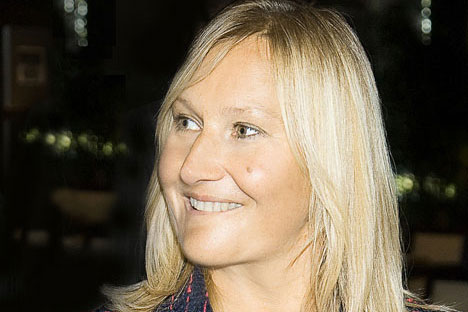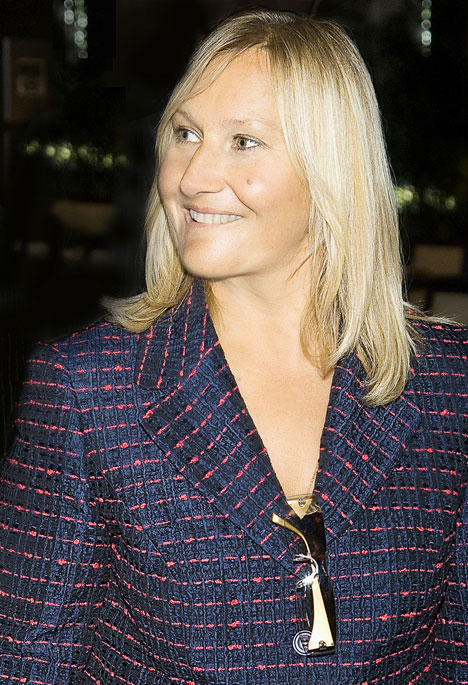
Baturina regrets that she was “sucked into political games” because her husband “happened to be mayor of Moscow.” Source: E. Nachitov / flickr.com

Baturina regrets that she was “sucked into political games” because her husband “happened to be mayor of Moscow.” Source: E. Nachitov / flickr.com
Yelena Baturina is an intriguing figure. Forbes magazine has listed her as Russia’s richest woman for the last five years, but she grew up in a two-roomed Moscow flat. Her life has been dramatic and controversial. Today, she is a billionaire businesswoman and last year she created her own design think tank, with a global outlook and ambitious aims.
From Moscow suburbs to Mayfair mansion
Born in the Soviet 1960s, Baturina describes herself as coming from a “simple, working class family”. She worked in a tool-making factory while studying in the evenings for a degree from the State University of Management in Moscow.
In the 1980s she met her husband, Yuri Luzhkov, who later became mayor of Moscow. During the gold rush 1990s, she built up a construction empire, Inteco, worth billions. In 2010, her husband lost his position, and she sold her companies and began to spend more time abroad.I
Baturina’s UK offices occupy a beautiful 18th-century townhouse in Mayfair. A dynamic artwork next to the reception desk turns poetic lines by Pushkin into currency rates via a tangle of electronic display strips.
When I first meet her, Russia’s richest woman looks distinctly bored, like a teenager who has been told to be polite to a tedious great aunt. “You don’t look very happy about being interviewed,” I observe. Baturina shrugs indifferently: “I’m just tired today.”
Towards the end of our increasingly animated conversation, she explains her reluctance: “I think my dislike of the press is just laziness because … I don’t want to waste my time preparing for interviews. But I understand that if I want my ideas to be heard, I have to.”
Creating our future
When I ask about BE OPEN, she has lots to say; it will unite various charitable projects and support “young, creative people.” Is her interest in the next generation connected to being a mother? Baturina has two daughters at university, aged 19 and 21. They are studying politics and economics, not design, she observes, but all young people “need a place to start in this world because they are creating our future.”
BE OPEN’s interpretation of “design” incorporates almost anything; during the next two years, the project will visit “the four corners of the world.” There are plans for an event in Delhi in February 2014 and another in Tokyo the following year.
The Indian project has an emphasis on handmade crafts, but is “not just an exhibition,” Baturina insists: “They are researching how … mutual penetration of cultures, knowledge and technology can bring out something new.”
Satisfaction is in the process
Baturina made her fortune in construction, but one favourite Moscow building project was never realised: Hamburg-based architect, Hadi Teherani, designed a series of futuristic domes that would have become the business complex “Cosmo Park”.
“The main thing for any business,” says Baturina, “is to understand that money is not the goal, but only the means of achieving a goal.” She inveighs against “the first wave of Russia’s super-rich”, who got their money “due to some sort of financial machinations.”
Now “they still want to play and they don’t know what game to play next,” so “they start buying bigger yachts than each other … or competing over who has a younger mistress. They never got the satisfaction of … achieving a goal as a result of the process … and that is why they are constantly dissatisfied.”
Is it different doing business in Europe? “No,” she laughs; “It’s exactly the same. There are interesting investment and production opportunities, there is ambition and competition, there are laws and certain business rules, and everywhere there are those who try to break them, fraudsters.” But she doesn’t feel it is a good time to invest in Russia. “I don’t see any guarantees of profitability for my investment,” she says.
Love, loyalty and London
When Yuri Luzhkov was chair of the Moscow City Council committee for Economic Development, Baturina, then a junior researcher, was sent to his office as an expert assistant. Was it love at first sight? “No,” she says decisively, “but we worked well together.” Of his time as mayor, she “always understood that it was fleeting.”
She was not shocked by the sudden change in people’s attitudes after her husband was fired. “Maybe we were not typical high-ranking officials,” she says, “because we always kept the family together and had close friends…”
With a daughter in New York and her mother in Moscow she travels a lot and the family are planning a Christmas reunion in Vienna. Baturina says she lives “mostly on aeroplanes”, but has several houses “that we visit from time to time, for holidays, for skiing, and in London and Moscow for living.”
“I am a happy person”
Is Moscow still home? “Yes, I am Russian,” she replies, adding: “and that explains everything!” She likes London (“even the weather”) and enjoys being able to walk around without security guards. It has been good for her daughters, Baturina says, to understand that they will get good marks at university “not because of their parents’ position, but because of their own hard work.”
Baturina regrets that she was “sucked into political games” because her husband “happened to be mayor of Moscow.” She doubts whether she is really (as she is frequently dubbed) Russia’s richest woman: “There are hidden billionaires that we know nothing about, but if you are talking about people who openly declare their income then – yes – I probably am the richest woman in Russia.”
“I think I am a happy person,” Baturina says, “because I can see the physical realisation of the things that I already built ... and if people in the future say that their starting point was my foundation, then I will be very happy.”
Yelena Baturina founded Inteko LLP in 1991. Initially the company manufactured plastic tableware.
In 1991 Baturina married Yuri Luzhkov, who in 1992 became the mayor of Moscow.
In 2001 Inteko entered the construction business, buying a controlling stake in DSK-3, one of the leading residential building companies in Moscow. The company managed to gain control of about a quarter of the prefabricated construction on the Moscow market.
In 2002 the company added a monolithic construction division. In addition, Inteko began buying cement factories, becoming the largest supplier of cement in the country. In 2003, a resolution of Moscow city government made the company one of the main investors in six integrated development projects all at once. In 2004 the company received the rights to renovate several buildings in the historic center of Moscow. In that same year Inteko received authorization from the Moscow city government to develop plots of land and design hotels and tourist resorts in Moscow.
In 2005, the company focused on building monolithic housing projects and commercial real estate.
From 2004 to 2007, Inteko constructed an academic building for Moscow State University. From 2005 to 2008 Baturina's personal fortune increased from $1.4 billion to $4.2 billion. By 2009, due to the economic crisis, it had fallen to $900 million.
According to experts, Inteko was worth $3 billion before the crisis. In 2010, it was estimated to be worth $1.5 billion.
In September 2011, a year after Luzhkov resigned as mayor of Moscow, Baturina sold Inteko. According to insiders, the value of the assets sold was about $1.2 billion. Baturina is now actively investing in the hotel industry. This began even before the events of 2010.
In 2009 the Grand Tirolia five-star hotel was built in the Austrian town of Kitzbühel at a cost of 35 million to 40 million euros ($47.6 million to $54.4 million). In 2010 the New Peterhof hotel opened in St. Petersburg.
In 2012 the small Quisisana Palace hotel in Karlovy Vary, Czech Republic, opened after being renovated. In 2013 the Morrison Hotel in Dublin, which had been purchased for $30 million, reopened after being remodeled. All of Baturina's hotels are managed by Martinez Hotels and Resorts, which is based in Austria. By 2015, Baturina plans to expand her business to 14 hotels.
All rights reserved by Rossiyskaya Gazeta.
Subscribe
to our newsletter!
Get the week's best stories straight to your inbox